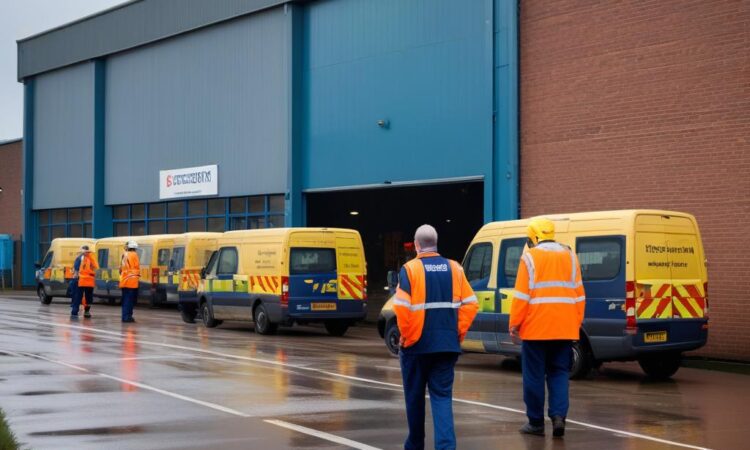Vauxhall Owner to Close Luton Factory
Car giant Stellantis, which owns Vauxhall, has announced it will close its van factory in Luton. The closure, scheduled for 2027, will result in the loss of hundreds of jobs and represents a significant blow to the local economy. The decision comes as part of Stellantis’ wider restructuring plan, aimed at streamlining operations and adapting to the changing automotive landscape.
The Luton plant, a cornerstone of the town’s industrial heritage, has been producing vans for decades. Its closure will leave a gaping hole in the local employment market, impacting not only the factory workers themselves but also the businesses and services that rely on their spending. The announcement has sparked widespread concern and anger among employees, local politicians, and community groups.
Stellantis has cited declining demand for the vans produced at the Luton plant as the primary reason for the closure. The company argues that the factory is no longer economically viable in its current configuration and that investing in its modernization would be too costly. However, critics have pointed to the lack of government support and investment in the automotive industry as a contributing factor to the decision.
The news has prompted calls for government intervention to mitigate the impact of the closure. Local MPs have demanded urgent meetings with Stellantis executives and government ministers to explore potential solutions, including retraining programs for displaced workers and financial assistance for businesses affected by the job losses. Trade unions have also voiced their opposition to the closure and pledged to fight for the rights of their members.
The closure will not only impact the workers and their families but will also have wider implications for the supply chain. Many smaller businesses rely on the Luton factory for contracts and orders, and their future is now uncertain. The economic consequences of the closure are likely to be felt far beyond the immediate vicinity of the factory.
The announcement highlights the challenges faced by the UK automotive industry in the face of global competition and technological change. The transition to electric vehicles and the increasing automation of production processes are forcing manufacturers to re-evaluate their operations and make difficult decisions.
Stellantis has stated that it will work with affected employees to provide support during the transition. This includes offering redundancy packages and assistance with finding new jobs. However, the reality for many workers will be a difficult and uncertain future. The closure represents a significant loss of skills and expertise, which will be hard to replace.
The closure of the Luton van factory is a stark reminder of the vulnerability of manufacturing jobs in the face of global economic pressures. It underscores the need for government policies that support the automotive industry and protect workers’ rights. The long-term consequences of this decision will be felt for years to come.
The situation raises questions about the future of manufacturing in the UK and the need for proactive measures to ensure the competitiveness of the industry. Experts predict that further factory closures could be on the horizon unless significant investment is made in research and development, worker retraining, and sustainable manufacturing practices.
While Stellantis has emphasized its commitment to its other UK operations, the closure of the Luton plant serves as a warning of the challenges that lie ahead for the automotive sector. The company’s decision underscores the need for both industry and government to work collaboratively to secure the future of manufacturing in Britain.
The closure highlights the importance of diversification and investment in new technologies to ensure the long-term sustainability of the UK economy. The government faces a significant challenge in supporting those affected by the job losses and in attracting new investment to the region.
The impact extends beyond the immediate economic consequences. The closure will have a significant social impact on the community, affecting families, and potentially leading to increased unemployment and social unrest. The government and local authorities must work together to mitigate these social impacts.
The debate surrounding the closure will likely continue for some time, with various stakeholders expressing their concerns and opinions. The incident underscores the complexities of managing large-scale industrial change and the need for a comprehensive approach to managing its consequences.
In the coming months and years, the focus will shift towards supporting those affected and finding new ways to revitalize the Luton economy. This will require a concerted effort from government, industry, and local communities to ensure a sustainable future for the region.
The long-term implications of this closure are far-reaching, affecting not only the workers and the local community but also the broader UK economy. It necessitates a critical evaluation of industrial policy and the need for a more robust framework to support the manufacturing sector.
This closure serves as a case study in the challenges facing global manufacturing in the 21st century. Factors such as automation, changing consumer demands, and global economic trends all play a significant role in these difficult decisions. The future will depend on adaptation, innovation, and collaboration between various stakeholders.
The situation is a complex one with no easy answers. However, the challenge lies in finding solutions that address the immediate needs of those affected while also considering the long-term economic and social implications for the region and the UK as a whole. This requires a multifaceted approach involving government, industry, and community organizations working together.
The closure underscores the importance of strategic planning, proactive measures to mitigate risks, and the need for a flexible and adaptable workforce capable of navigating the changing demands of the global marketplace.
The story continues to unfold, with ongoing discussions regarding support packages, retraining initiatives, and the future economic development of the Luton area. The closure of the Vauxhall factory will undoubtedly serve as a significant case study in the complexities of modern industrial relations and economic transformation.

